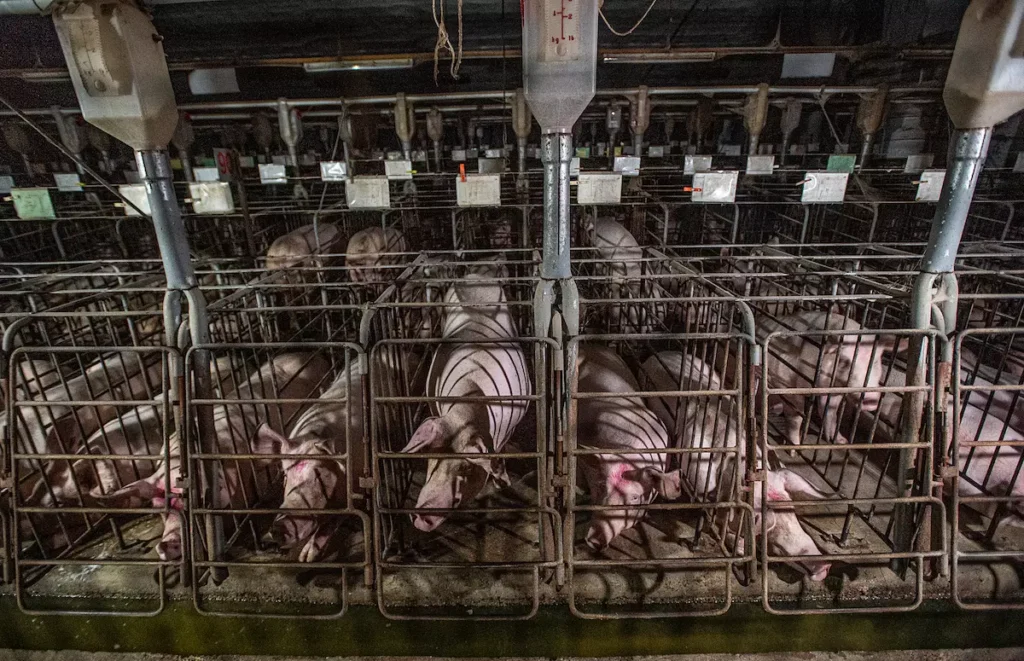Justices determine states can halt sale of animal products derived from extreme animal confinement
Washington, D.C. — Animal Wellness Action and the Center for a Humane Economy expressed unbridled enthusiasm for a U.S. Supreme Court decision specifically upholding California’s Proposition 12, but which has much broader implications for the rights of states to promote humane treatment and food safety values. Approved by 63 percent of California voters in 2018, Prop 12 built on an anti-confinement measure (Prop 2) enacted a decade earlier that restricted extreme confinement of laying hens, veal calves, and breeding pigs by stipulating that any eggs or pork sold in the state come from animals afforded sufficient space to move around, regardless of where the animals are raised.
In upholding California’s law, the Court stated that the Pork Producers “invite us to fashion two new and more aggressive constitutional restrictions on the ability of States to regulate goods sold within their borders. We decline that invitation. While the Constitution addresses many weighty issues, the type of pork chops California merchants may sell is not on that list.” (emphasis added)

“Today’s landmark ruling affirms the right of states to institute policies to promote anti-cruelty and food safety standards,” said Wayne Pacelle, who helped launch Prop 12 in 2017, and is now president of Animal Wellness Action and the Center for a Humane Economy. “The pork industry has for decades blocked any rules at the federal level to promote the humane treatment of farm animals and this was their attempt to gut state rules, too. It is a loss for hog factory farmers and a win for the vast majority of Americans who want to know that animals raised for food were not immobilized and otherwise tormented in production.”
The pork industry can meet California’s humane treatment standards with existing sow housing systems, according to pleadings that were filed with the U.S. Supreme Court by two leading agricultural veterinarians and a set of organizations led by the Center for a Humane Economy and Animal Wellness Action. The pork industry’s position was further undercut by the fact it is already supplying gestation crate-free pork to the many large retailers and restaurant chains that have responded to consumer demand for humanely raised animals. As the filed briefs stated, “If pork producers can supply crate-free pork to tens of thousands of McDonald’s outlets – to say nothing of the dozens of other companies across the nation with tens of thousands of their own outlets – then it can supply California’s market.”
The decision is expected to have immediate impacts not just in California — where the law was scheduled to be fully implemented by January 1, 2022, but which has been delayed, in part, because of the ongoing litigation — but in other parts of the country. State authorities in Massachusetts had put a hold on implementation of a very similar law there pending the Supreme Court’s ruling on the matter. Massachusetts voters approved the restrictions of sale of pork coming from unsafe and inhumane housing systems with an astonishing 78 percent of the vote, repudiating all of the overwrought and exaggerated arguments from plaintiffs during the political campaign there. That law also can now go into full effect.
“The pork industry asked the court to strike down a law democratically-enacted by the most populous state with the largest economy in the Union, largely for the financial benefit of a handful of giant pork conglomerates — two of the largest of which are foreign-owned,” said Center for a Humane Economy’s Senior Attorney Kate Schultz. “Thankfully the Court’s analysis of the facts and the law showed that there were no legitimate grounds for the Court to do so.”
In addition to filing its own brief, the Center and Animal Wellness Action also worked closely with two agricultural veterinarians, Drs. Jim Keen and Thomas Pool, to file their own expert amici brief that laid bare the false claims of the industry and the veterinarians who work for it. The American Association of Swine Veterinarians filed papers with the Court that misleadingly asserted that Proposition 12 “mandated” group housing for sows, and further argued that these group settings were injurious to herd health. In addition to correcting the record on the requirements under the law — that the industry is free to continue to use larger gestation crates as needed — Drs. Keen and Pool also crafted a compelling compendium of the many public health and animal welfare consequences of the continued use of gestation crates prevalent in our modern factory farming system.
“The Court recognized that the doomsday forecasting of extraterritorial effects for the pig industry was a contrivance and a charade,” added Pacelle. “Key players in American pork production have said they can readily meet the demands of the California market. If factory farmers in Iowa and North Carolina don’t want to supply the California market, don’t do it. The humane treatment standards in California have already been recognized as a market opportunity by thousands of pig farmers who actually engage in responsible animal husbandry and don’t immobilize animals in crates.


